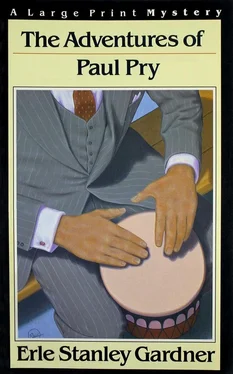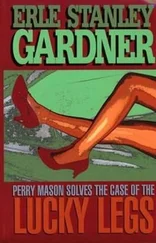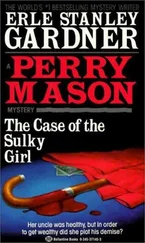“You’re going to make all this money tomorrow?”
“You bet, baby. I’m sending my man on the 2.10 train. He’ll be back with the unsold gems sometime later. I don’t know just what train he’ll take. He may have some cash with him, so I’ll probably have the local police give him an escort back. But as far as the gems are concerned, they’re insured, and they’ll be handled just like you’d handle a bag full of clothes.”
She watched him with eyes that were so wide and deep they fairly radiated innocence.
“But I’ll bet you have a great big, husky man as a messenger!”
“Wrong again, baby. He’s just a young fellow, tall and thin.”
“You must dress him in inconspicuous clothes.”
“No. He wears just ordinary clothes. He usually wears a red tie, and a blue striped suit.”
“I’ll bet you fool them on the bag. I’ll bet you make it look cheap and battered, so no one would suspect it held a lot of gems.”
Paul Pry twisted his glass.
“Baby, you might have a good idea there, at that. But you’re wrong again. I let him carry a black handbag. It’s studded with brass rivets so it’d be easy to identify if anybody tried to grab it. But, aside from that, it’s just an ordinary bag, and it’s in pretty good shape.”
She frowned, let her eyes drift to her fingertips again. All of a sudden she was on her feet.
“I’ve almost forgot an appointment with the manager over a new song I’m trying out. I must run. Bye-bye.”
And she was gone with a flash of graceful legs, a flutter of flouncing ruffles, and a languishing glance over her bare shoulder.
Paul Pry waited for ten minutes.
At the end of that time a waiter informed him that Miss Tanner had been summoned to the bedside of her mother, who had been taken violently ill. She wished to be excused, and to ask the gentleman to please come back some other evening.
Paul Pry showed the proper amount of concern over the condition of the mother, the proper amount of irritation at having a conquest snatched from him, and, walking rather carefully as though the alcohol had rendered him a little unsure of his footing, left the nightclub.
Paul Pry purchased two bags at a store which specialized in such articles. He left orders that the small black bag was to be studded with brass rivets.
The large, tan bag he took with him.
He purchased a package of fish hooks and some small rivets. When he had finished with the large tan bag it looked perfectly conventional from the outside. But that was as far as conventionality went.
The bottom had been entirely removed, and the interior had been so studded with fish hooks as to make the bag highly effective for a certain purpose, and utterly useless for any other purpose.
When Paul Pry had fixed the bags to suit himself, he telephoned to Moffit at Centerville.
“Moffit, this is Garfield. I’ve been thinking over the necklace, and I’m going to give your wholesaler another chance. I promised you I would, and I’m going to keep that promise, although I’m disgusted with his treatment.
“Get him on the telephone and tell him to have an assortment of first-class stuff sent to you. He’ll have to get it there on the next interurban, though, because I’m going to leave town tonight.
“It’s 1.15, and he can get a messenger on the 2.10 train. I’ll be there when the train gets in and let you know one way or the other within ten minutes after I see the necklaces.”
And Paul Pry shut off the voluble thanks of the jeweller, hung up the telephone, and gave his attention to certain details of transportation, which included an appointment with the pilot of the fastest plane the city could command.
These details were all arranged by two o’clock. At precisely two nine and one half, Paul Pry rushed through the gates at the interurban depot. In his hands were two bags, one a yellow bag that had no bottom, the other a black bag studded with brass studs.
They held the car for him to get aboard. His eyes sought for, and found, a slender figure immersed in the sporting page of the afternoon paper. The car started with a lurch as Paul Pry hesitated, opposite the seat occupied by this man.
The lurch of the car threw Paul Pry off balance.
He lunged to one side, toppled, threw out the hand containing the yellow bag for support. That bag smashed down upon the seat, squarely over the black one already there. His head butted into the chest of the man who was reading the sporting page.
That individual got into action quickly.
He was on his feet in a single swift motion. The afternoon paper was dashed to the floor. The man’s right hand swung to his hip pocket. Then, as he saw a black bag, studded with brass rivets, his right hand hesitated.
“What the devil?” he growled.
“I’m going to sue the railroad company!” bellowed Paul Pry. “You’re a witness. Give me your name and address.”
The slender man retrieved the black bag, held his hand protectingly upon it.
“Aw go sit on a tack,” he invited. “You can’t use these cars as a promenade while they’re goin’. Sit down and shut up.”
The conductor hurried forward, took Paul Pry by the shoulders, and guided him to a vacant seat, sought to soothe his ruffled feelings. It was the conductor himself who fetched the yellow bag from the seat where Paul Pry had collided with the slender man.
And that individual, as though suspicious of further interference, transferred the black, brass-studded bag to the window side of the seat, smoothed out the rumpled newspaper, glowered about him, and returned to the sporting page.
Twenty minutes later the car made its first stop, and Paul Pry walked quietly down the aisle, stepped to the platform and walked to a waiting car. The car whisked him toward a level field where a squat plane awaited, engine already warmed up. The forward cockpit was piled with suitcases, and Paul Pry managed to insinuate himself in between three suitcases, adjusted a helmet and nodded.
The plane seemed to roar into life like a frightened quail. It scuttled down some hundred feet of the field, went into the air on a sharp incline, zipped upward, and within a matter of seconds was but a dot against the blue.
Precisely fourteen minutes later, Paul Pry was transferring his baggage at the Centerville airport from the plane to automobile. Another six minutes and he was at the hotel, the porter glancing at the baggage with a look of admiration on his features.
“By gosh!” he blurted, “I’ll say you’re a wonder when it comes to getting action, Mr. Garfield.”
Paul Pry grinned.
“I shook ’em up. Bring the baggage up to my room.”
And he went to his room, took down the telephone and called Moffit.
“I’m in my room, ready packed, Mr. Moffit. I’m leaving on the 6.20 train. I wish you’d bring the necklaces over as soon as they arrive.”
“I certainly will, Mr. Garfield,” promised Moffit.
Paul Pry cleared his throat.
“Look here, Moffit, there’s another matter I wanted to mention to you. Last night I mentioned to a casual acquaintance — a young lady — that I was arranging to have some stones sent down to you today. I didn’t mention where from or on what train. But she showed a marked interest that was a little too marked.
“I can’t tell you who this young woman was. Frankly, I met her in a picture show and struck up an acquaintance with her. She sat next to me, and — well, I felt from the way she laughed, and the sidelong glances she directed at me, that she wouldn’t object to my speaking to her.
“Now I’ve been worried about that. I’ve heard gangsters sometimes use women as scouts. I wish you’d tell Chief Kelley, and have him arrange to have another officer with him when he meets the interurban. I’m worried.”
Читать дальше












